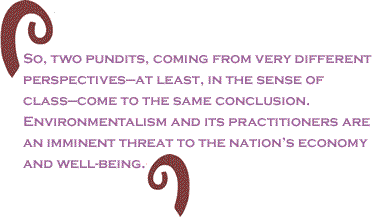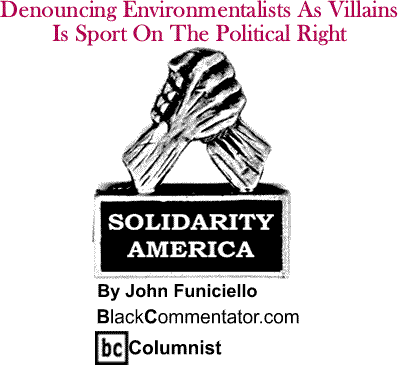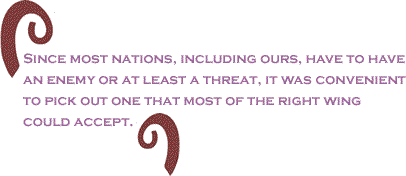
|
||||||||||||||||||||||
|
||||
 |
||||
| A few years after America celebrated the fall of the Berlin wall, the Soviet Union collapsed and pundits celebrated with much fanfare the �victory� of capitalism over communism. Within a few days of the collapse of the Soviet Union, one of the best known right-wing radio talk show entertainers, Rush �Oxycontin Boy� Limbaugh, was in a serious talking crisis.� His favorite and frequent target�and those who he might have considered sympathizers�was gone in a flash. In a matter of hours he came up with a new pervasive foe�environmentalists and their cause, protecting the environment and making the environment safer and healthier for humans, wildlife, and the planet, in general.
Since most nations, including ours, have to have an enemy or at least a threat, it was convenient to pick out one that most of the right wing could accept.� After all, environmentalists:� want to clean up the water in our rivers, streams, lakes, and oceans; prevent the release of toxins into the air we breathe, want to preserve and protect national parks and other wild places, recycle every bit of waste material possible, and reduce the effects of the burning of fossil fuels. In fact, the goal of some Americans is to find other means to move people and goods about the country�to finally end our dependence on fossil fuels, no matter what the source of the fuels.� And, this is just a start on what�s needed to try to repair the environmental integrity of the planet. For these offenses, environmentalists risk the wrath of none other than George Will, the syndicated columnist, who last month warned about those sultans of shortages, environmentalists, who are often liberals, as well. Will, a Pulitzer-prize-winning writer, has identified environmentalists as those who relish scarcity (as in oil), because it gives the government reason to boss people around and tell them what to drive, when to drive, what to eat, and all of the other things that governments order the people to do. In a November column, Will was beginning to sound like the broadcast bloviators and most Republicans during the recent presidential campaign:� �Drill, baby drill!� He has assumed that the previous warnings that we were running out of fossil fuel�drawing our oil reserves down to a dangerously low level�were the ravings of a bunch of Chicken Littles, warning that our way of life was in peril.� That�s because, he noted, previous warnings proved to be a little premature.� There was a lot of oil left. He�s also become something of a climate change denier, though a little more cautious than the chatterers of the airwaves.�
It could be that he�s not as quick on the uptake as Big Talk, but perhaps it was because he wanted to see how the environmentalist-threat to America fit into his particular view of the world.� Being off on the right of the political spectrum, of course he sees environmentalism as a way of giving up control of our daily lives to Big Government. Quoting Daniel Yergin, who he described as an oil historian, noted that there is enough oil for �decades to come,� and he wrote:� �Such good news horrifies people who relish scarcity because it requires�or so they say�government to ration what is scarce and to generally boss people to mend their behavior: �This is the police! Put down that incandescent bulb and step away from the lamp!�� So, two pundits, coming from very different perspectives�at least, in the sense of class�come to the same conclusion.� Environmentalism and its practitioners are an imminent threat to the nation�s economy and well-being. It�s likely that neither has ever visited the places where environmental struggles are ongoing at a fierce pace�in those areas where there are mostly people of color and poor people, or the places where there are few people at all. What comes to mind is the locations of toxic waste and nuclear waste dumps; locations of incinerators of trash and other detritus of modern society; the proposed nuclear waste dump for Yucca Mountain in Nevada, a site sacred to Native Americans; the mountaintop removal by coal companies in Appalachia, where a thousand miles of rivers and streams have been destroyed and mountains leveled, and �cancer alley,� found along the coast of Louisiana.
All of these and thousands more�including numerous Superfund sites around the country�are places where, for the most part, only the most vulnerable Americans live.� It�s as if the defenders of the environmentally-debased status quo do not have family members and friends who will have to live in this world after their masters have their way with it. The amassed wealth of the few, who are securely attached to Corporate America, will not allow them to escape the reckoning to come.� If they are not the ones who face that reckoning, their children and grandchildren will.� Where do these people live and what do they see? Will and Limbaugh wander the public square (what�s left of it) as the mouthpieces of the powerful and rich, who pay no attention to the people who suffer physically and emotionally from the environmental threats to their health and the health their families.� Rather, they are paid to keep commerce and money flowing.� It�s what America is about.� If environmentalists get in the way, they have to be silenced or marginalized�whatever it takes to facilitate the transfer of wealth, from the people, to that faceless �top 1 percent� of Americans.� That�s the function of Will and Limbaugh. It�s hard to tell what the latter believes, but Will, at least, with the integrity of a lifelong fan, writes well about baseball.� Maybe, he should stick to that.� BlackCommentator.com Columnist, John Funiciello, is a labor organizer
and former union organizer. His union work started when he became
a local president of The Newspaper Guild in the early 1970s. He
was a reporter for 14 years for newspapers in |
||||
 |
||||
If you would like to comment on this article, please do so below. There is a 400 character limit. You do not need a FaceBook account. Your comment will be posted here on BC instantly. Thanks. Entering your email address is not mandatory. You may also choose to enter only your first name and your location.
|
||||
Thank you very much for your readership. |
||||
| Any BlackCommentator.com article may be re-printed so long as it is re-printed in its entirety and full credit given to the author and www.BlackCommentator.com. If the re-print is on the Internet we additionally request a link back to the original piece on our Website. | ||||
| |
||||
| December
3 , 2009 Issue 353 |
| Executive Editor: Bill Fletcher, Jr. |
| Managing Editor: Nancy Littlefield |
| Publisher: Peter Gamble |
| Est. April 5, 2002 |
| Printer Friendly Version in resizeable plain text format |
 |

|
 |
| |
| |













































